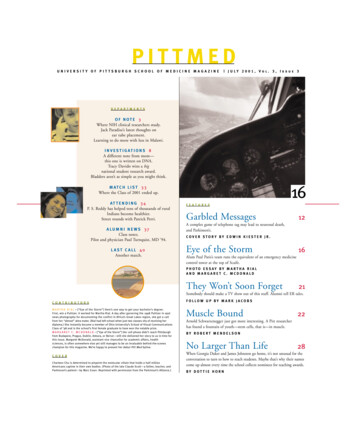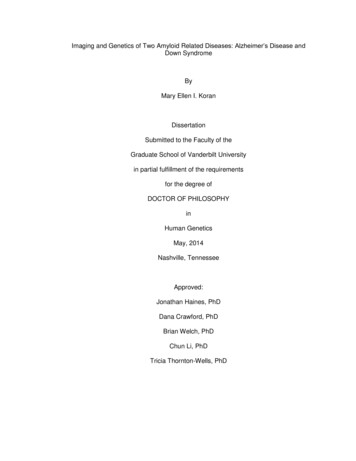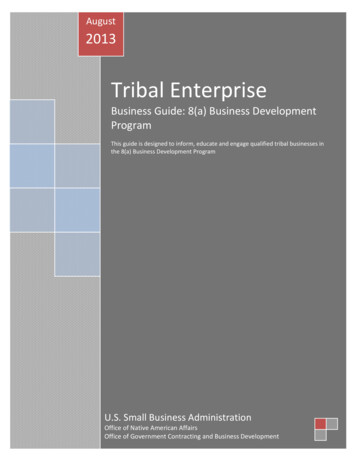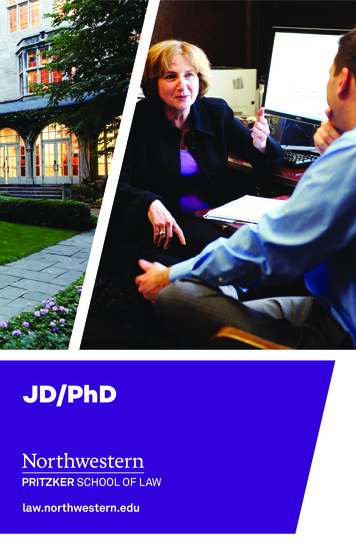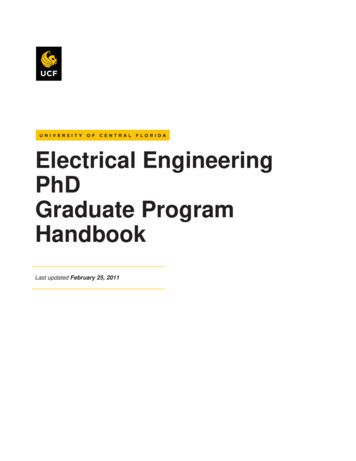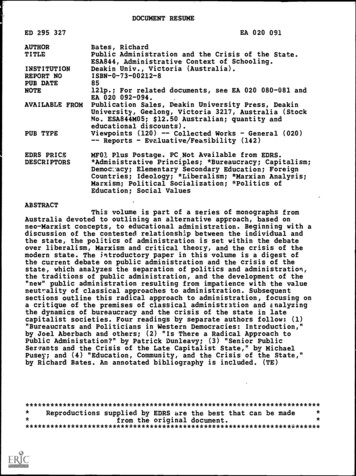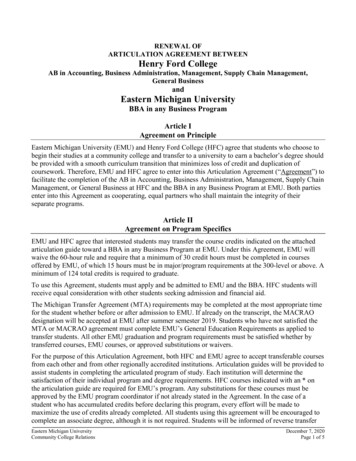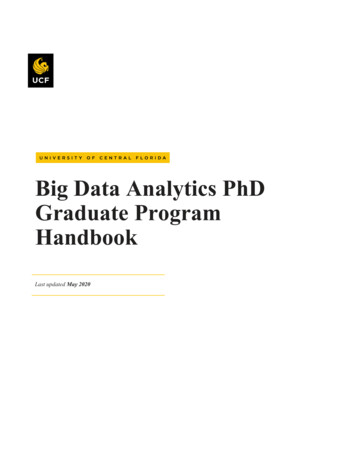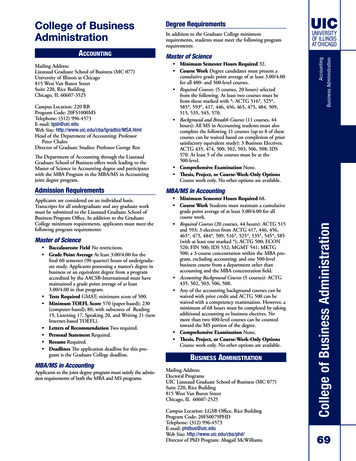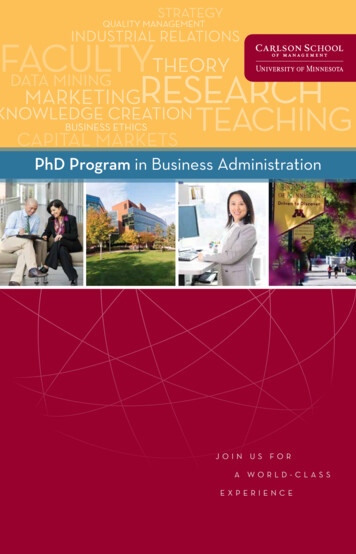
Transcription
PhD Program in Business AdministrationJoin us fora world-classexperience
A great place to learn businessThe Carlson School’s PhD program in business administration prepares students for careersas faculty members at universities throughout the world. Students gain experience inconducting basic and applied research, skills for continued professional and scholarshipgrowth, and grounding in the fundamentals of good teaching. Graduates go on to facultypositions at top research institutions prepared to teach future business leaders. Havinggained mastery of a discipline within business administration, they have the tools tocontribute to the field’s future development.While here, students at the Carlson School benefit from interactions with our worldrenowned faculty, participation in groundbreaking research, and the accessibility of one ofthe nation’s leading business communities. The Twin Cities is headquarters for eighteenFortune 500 companies, as well as a thriving metropolitan community that provides numerouscultural and recreational opportunities. The school’s unique combination of resources makesit a great place to live and a premier place to gain a relevant, cutting-edge PhD.The PhD program attracts students with outstanding undergraduate records, graduatecoursework, and work experience. Students come from many countries and states andshare their diverse perspectives, providing stimulating discussions inside and outsideof the classroom. Each student chooses one of seven concentration areas in businessadministration for deeper study: Accounting, Finance, Information and Decision Sciences,Marketing, Strategic Management and Entrepreneurship, Supply Chain and Operations, andWork and Organizations.To support our PhD students, the Carlson School provides five years of stipends, conferencetravel and research support, tuition waivers, student fee waivers, and paid health insurancecoverage, as long as the student continues to make good progress in the program.Come join us for a world-class experience!Dr. Shawn Curley, DirectorPhD Program in Business Administration}For more information about our program, please visit: carlsonschool.umn.edu/degrees/phd1
The Carlson School PhDResearchExpanding knowledgeCarlson School PhD students have theopportunity to:Pursue rigorous, high-quality researchwith faculty members who arerecognized for their own cutting-edgeresearch programsBegin research training early in theirprogram, generally in the first year ofgraduate studyAcquire specialized knowledgeand expertise that prepares themto join the faculty of majorresearch institutionsTeachingDisseminatingknowledgeThe PhD program offers studentsrich teaching opportunities. As afoundation, PhD students participatein the Teaching Initiative Program(TIP). TIP uses a variety of activitiesto develop student competence andconfidence in instructional abilities.These include:Teaching workshops provided byUniversity of Minnesota staff andcoordinated by the Carlson School’sPhD program officeAn in-class teaching experience,a mentoring experience, anddevelopment of a teaching portfolioFor international students, a TeachingAssistant English program} cei.umn.edu2
Concentrating your skillsReceive researchand teachingexperienceSpecialize and developskills in both theory buildingand empirical researchEngage inindividualizedprograms of studyChoose from seven areas in business administration to focus your studies:Accounting } z.umn.edu/CarlsonPhDAccountingFinance } z.umn.edu/CarlsonPhDFinanceInformation and Decision Sciences } z.umn.edu/CarlsonPhDIDScMarketing } z.umn.edu/CarlsonPhDMarketingStrategic Management and Entrepreneurship } z.umn.edu/CarlsonPhDSMESupply Chain and Operations } z.umn.edu/CarlsonPhDSCOWork and Organizations } z.umn.edu/CarlsonPhDWorg3
AccountingThe distinguished reputation of Carlson School’s Accounting PhD program is a point ofextreme pride for our department’s faculty. We are committed to upholding and expandingthis reputation through our continued dedication to working closely with our students toprepare them to enter a life of scholarly research. As one of the premier theoretical accountingprograms in the nation, we are ranked #1 in analytical financial accounting. Empirical accountingresearch has also become a strong component of the program due to the significant increasein faculty advising capacity in recent years. Students gain immediate and continued exposurein “real time” to the most important research in the field by taking a wide array of seminars andattending the department’s active research workshop series as well as the two national researchconferences we host each year. We feel that the measure of any PhD program is the successof its graduates, so we are especially proud of our performance on this dimension, too. Ourgraduates have been placed and tenured at the most prestigious business schools in the nation,including those at Carnegie Mellon University, the University of California at Berkeley, theUniversity of Chicago, the University of North Carolina at Chapel Hill, the University of TexasAustin, Northwestern University, University of Utah, and the Ohio State University. To find outmore about this exceptional program visit: z.umn.edu/CarlsonPhDAccountingCurriculum & CoursesStudents are, in general, required to take a minimum of twelve credits ofAccounting Department PhD seminars, at least eight credits of supportingcoursework outside the Carlson School of Management, and twelvecredits of a methodology. A complete program of study consists of atleast forty credits of coursework overall.Accounting PhD Seminars Offered:Accounting PhD CoordinatorHaiwen (Helen) ZhangAssociate Professor, CarlL. Nelson Professorship inAccountingPhD, University of MinnesotaAreas of Interest:Security & disclosure regulations,corporate risk management, andfinancial reporting of banksAcct 8801: Topics in Empirical Research IAcct 8802: Topics in Empirical Research IIAcct 8803: Topics in Empirical Research IIIAcct 8811: Topics in Information Economics IAcct 8812: Topics in Information Economics IIAcct 8813: Topics in Information Economics IIIAcct 8821: Topics in Capital Markets IAcct 8822: Topics in Capital Markets IIAcct 8823: Topics in Capital Markets IIIAcct 8831: Topics in Analytical Research IAcct 8832: Topics in Analytical Research IIAcct 8833: Topics in Analytical Research IIIAdmissions Statistics (Fall 329Program sizeAverage agein program323Average GRE730Average GMAT
Accounting FacultyCyrus AghamollaAssistant ProfessorPhD, Columbia UniversityAreas of Interest: Disclosure, analysts, financialreporting, conservatism, corporate governanceSalman ArifAssistant ProfessorPhD, Stanford UniversityAreas of Interest: Capital markets, disclosure, assetpricing, financial reporting, behavioral financeVivian W. FangAssociate Professor, Honeywell Professorship inAccountingPhD, Tulane UniversityAreas of Interest: Stock market liquidity, voluntarydisclosure, capital marketsFrank GiglerProfessor and Curtis L Carlson Chair in AccountingPhD, University of MinnesotaAreas of Interest: Theory of financial disclosure,industrial organization of audit marketsMichael IselinAssistant ProfessorPhD, The Ohio State UniversityAreas of Interest: Accounting standards, financialinstitutions, risk management, corporate disclosure,not-for-profit accountingChandra S. KanodiaProfessor and Arthur Andersen & Co./Duane KullbergChair in Accounting & Information SystemsPhD, Carnegie Mellon UniversityAreas of Interest: Real effects of accountingmeasurement and disclosures, economicconsequences of accounting conservatism and marketto-market accounting, implications of higher orderbeliefs in capital markets and information economicsNan LiAssistant ProfessorPhD, Columbia UniversityAreas of Interest: Executive compensation &corporate governance, debt contracting, andinternational accountingPaul MaAssistant ProfessorPhD, Stanford UniversityAreas of Interest: Financial disclosure, empiricalasset pricing, behavioral financeJoshua M. MadsenAssistant ProfessorPhD, University of ChicagoAreas of Interest: The role of information in capitalmarkets, anomalies, debt contracting, financialdisclosures and regulation, and supply chainsTjomme RusticusAssistant ProfessorPhD, University of PennsylvaniaAreas of Interest: Capital market effects of accountinginformation, market efficiency, corporate governanceand executive compensation, research methodsPervin ShroffDepartment Chair; Professor and Frederick H. GroseChair in AccountingPhD, Columbia UniversityAreas of Interest: Capital markets, financial reporting,and corporate financeGaoqing ZhangAssociate ProfessorPhD, Carnegie Mellon UniversityAreas of Interest: Financial accounting, financialinstitutions, higher-order beliefs, global games,industrial organizationHaiwen (Helen) ZhangAssociate Professor, Carl L. Nelson Professorship inAccountingPhD, University of MinnesotaAreas of Interest: Security & disclosure regulations,corporate risk management, and financial reporting ofbanks5
FinanceThe PhD concentration in finance emphasizes theoretical economics and provides a rigorous,analytically-grounded education. The Finance Department has a long and prominent intellectualhistory. Ideas that we now take as commonplace, such as moral hazard problems caused bydeposit insurance and the Hansen-Jagannathan bounds in asset-pricing, have their origin atthe Carlson School. Faculty members are also dedicated to producing top-flight scholars byoffering both doctoral courses that focus on cutting edge research as well as collaborativeresearch opportunities. Students who have strong interests and abilities in quantitative methods,mathematics, and economics will find this program both challenging and stimulating. For moreinformation about this program visit: z.umn.edu/CarlsonPhDFinanceCurriculum & CoursesThe PhD finance concentration requires a strong mastery ofeconomic theory. During the first year students take doctoral-levelcourses in microeconomic theory, econometric analysis, and four2-credit finance PhD seminars. Second-year coursework includesadditional finance doctoral seminars along with elective courses inaccounting, economics or mathematics.Finance PhD Seminars Offered:Finance PhD CoordinatorFina 8802: Theory of Capital Markets I: Discrete TimeRobert S. GoldsteinFina 8803: Theory of Capital Markets II: Continuous TimeProfessor and Piper JaffrayChair in FinancePhD, University ofCalifornia - BerkeleyFina 8804: Advance Continuous Time FinanceFina 8810: Topics in Asset PricingFina 8812: Corporate Finance IAreas of Interest:Term structure of interestrates, credit risk, capitalstructure theory, generalequilibriumFina 8820: Topics in Corporate FinanceFina 8822: Empirical Methods in FinanceFina 8823: Empirical Corporate FinanceFina 8890: Topics in FinanceAdmissions Statistics (Fall 829Program sizeAverage agein program326Average GRE723723Average GMAT
Finance FacultyHengjie AiAssociate ProfessorPhD, University of MinnesotaAreas of Interest: Financial economics,macroeconomics, economic theoryJuliana T. SalomaoAssistant ProfessorPhD, Stanford UniversityAreas of Interest: International economics,macroeconomics, financeGordon J. AlexanderProfessor Emeritus and John Spooner Chair inInvestment ManagementPhD, University of MichiganAreas of Interest: Value at risk, portfolio theoryand management, short selling and marginpurchasing, estimation risk, market microstructure,investment companiesRaj SinghAssociate Dean of Undergraduate Program, Arthur RUpgren Professor of FinancePhD, Carnegie MellonAreas of Interest: Corporate finance, agency theory,auction theory, market microstructureJacelly CespedesPhD, University of Texas – AustinAreas of Interest: Corporate finance, householdfinance, financial intermediation, fintechMartin SzydlowskiAssistant ProfessorPhD, Northwestern UniversityAreas of Interest: Microeconomic theory, contracttheory, corporate financeMurray Z. FrankProfessor and Piper Jaffray Endowed Faculty Fellowin FinancePhD, Queens UniversityAreas of Interest: Corporate capital structureRichard ThakorAssistant ProfessorPhD, Massachusetts Institute of TechnologyAreas of Interest: Investigating how financialfrictions and constraints affect financial policyand real outcomesRobert S. GoldsteinProfessor and Piper Jaffray Chair in FinancePhD, University of California - BerkeleyAreas of Interest: Term structure of interestrates, credit risk, capital structure theory, generalequilibriumTracy Yue WangProfessor and John Spooner Chair in InvestmentManagementPhD, University of Maryland-College ParkAreas of Interest: Corporate finance, corporategovernance, behavioral financeXiaoji LinPhD, University of MinnesotaAreas of Interest: Asset pricing, macroeconomics andcorporate financeColin WardAssistant ProfessorPhD, University of Pennsylvania, The Wharton SchoolAreas of Interest: Asset pricing, international finance,macrofinance, investmentsErik LoualicheAssistant ProfessorPhD, Northwestern UniversityAreas of Interest: Asset pricing and macroeconomicsPinar Karaca MandicProfessor, C. Arthur Williams Jr. Professor inHealthcare risk management, Academic Director,Medical Industry Leadership InstituteStephen ParenteProfessor and Minnesota Insurance Industry Chairof Health Finance, Associate Dean of MBA Program,Carlson Global Institute Director, Medical IndustryMBA (MIMBA)PhD, Johns Hopkins UniversityAreas of Interest: Health e-commerce, managed care,health information technology, health economicsAndrew WhitmanProfessorPhD, University of Wisconsin-MadisonAreas of Interest: Risk management and insurance,insurance theory and practice, employee benefits,personal financial planningAndrew WintonDepartment Chair, Professor and Minnesota Chair inBanking & FinancePhD, University of Pennsylvania, The Wharton SchoolAreas of Interest: Corporate finance and ownershipstructure, financial contracting, financial institutions7
Information & Decision SciencesThe PhD program in the department of Information and Decision Sciences is among the topranked programs in the country. The University of Minnesota was one of the first schools toestablish a doctoral program in management information systems and remains a top-five leaderin the study of MIS. It is recognized worldwide for shaping the field. Factors contributing to thisrecognition are: Defined relevant discipline areas through research, writing, and editorial contributions inmajor academic and practitioner journals Innovations in curriculum Number and quality of our graduates Faculty leadership in professional societies and journals Developed major organizational links between faculty and practitionersOur faculty conduct theoretical and empirical research that addresses the role, impact,and development of IT innovations from a business perspective in business process,organizational, and market contexts. This provides a wealth of research opportunities fordoctoral students to collaborate with faculty. For more information about this program visit:z.umn.edu/CarlsonPhDIDScCurriculum & CoursesStudents take a minimum of 40 credits of coursework. Requiredmajor field coursework includes an introductory IDS PhD seminar(IDSc 8511) and four pillar IDS seminar courses (IDSc 8521, 8531, 8541,and 8721). In addition, 16 credits of methods and supporting fieldcourses are required, including eight credits of research methodscourses. These credits must be 5000-level or above and caninclude such courses as multivariate statistics, regression analysis,structural equation modeling, experimental design, econometrics,microeconomics, game theory, artificial intelligence, data mining,machine learning, etc.Information & DecisionSciences PhD CoordinatorYuqing (Ching) RenIDSc PhD Seminars Offered:IDSc 8511: Conceptual Topics and Research Methods in IDScIDSc 8521: Information System DevelopmentIDSc 8531: Organizational Theory and Research in Information SystemsIDSc 8541: Intro to Economics of Information SystemsIDSc 8620: Data Mining and PersonalizationIDSc 8640: Social Media and Online CommunitiesIDSc 8721: Behavioral Decision TheoryAssociate ProfessorPhD, Carnegie Mellon UniversityAreas of Interest:Human robot collaboration, socialmedia, online communities, mindfuluse of smartphonesAdmissions Statistics (Fall 629Program sizeAverage agein program320Average GRE723Average GMAT
Information and Decision Sciences FacultyGediminas AdomaviciusDepartment Chair, Professor and Carolyn I. AndersonChair in Business Education ExcellencePhD, New York UniversityAreas of Interest: Personalization technologies andrecommender systems, knowledge discovery and datamining, electronic market mechanismsDe LiuXian Dong Eric Jing Professor, Academic Director,Master of Science in Business AnalyticsPhD, University of Texas-AustinAreas of Interest: gamification, social production ofcontent, AI and chatbots, crowdfunding, auction andcontests, economics of online fraudsRavi BapnaProfessor and Curtis L. Carlson Chair in BusinessAnalytics and Information Systems; Academic Director,Carlson Analytics Lab; Associate Deanfor Executive EducationPhD, University of ConnecticutAreas of Interest: Social influence and engagement,social contagion, prescriptive analytics, randomizedfield experiments, and machine learningVeronica MarottaAssistant ProfessorPhD, Carnegie Mellon UniversityAreas of interest: Economic and social impacts ofinformation technologies and social media, onlineprivacy, online advertising, information economicsSofia BapnaAssistant ProfessorPhD, University of MinnesotaAreas of Interest: Digital platforms, gender gaps, andentrepreneurshipXuan BiAssistant ProfessorPhD, University of Illinois at Urbana-ChampaignAreas of Interest: Data science, statistical learning,recommender system, personalized marketing, salesforecastingGordon BurtchAssociate Professor & McKnight Presidential FellowPhD, Temple UniversityAreas of Interest: The economics of informationsystems, with a particular focus on the drivers andimplications of participant behavior in marketplacesthat incorporate social media, crowdsourcing and usergenerated contentJason ChanAssistant Professor & Mary and Jim Lawrence FellowPhD, New York UniversityAreas of Interest: Social and economic impactsof online platforms, health IT, crowdfunding andcrowdsourcing, design implications of IT artifactsShawn CurleyProfessor, Director of Graduate Studies and PhDProgram DirectorPhD, University of MichiganAreas of Interest: Decision and judgment processesunder uncertainty, recommender systems, auctionbehaviorAlok GuptaAssociate Dean of Faculty and Research;Professor and Curtis L. Carlson Chairof Information ManagementPhD, University of Texas-AustinAreas of Interest: Economic engineering of digitalmechanisms, electronic commerce, informationeconomics, computational mechanism design, onlineauctions and merchantile processes, network externalities and pricing, data communication and computernetworks, real-time mechanisms, digital securityEdward McFowland IIIAssistant ProfessorPhD, Carnegie Mellon UniversityAreas of Interest: Large-scale statistical machinelearning, computational social science, data science,and anomalous pattern detectionGautam RayAssociate ProfessorPhD, Ohio State UniversityAreas of Interest: Electronic markets, e-commerce,search costs and market behavior, impact of IT onorganizational structure and performance, knowledgesharingYuqing (Ching) RenAssociate Professor & Mary and Jim Lawrence FellowPhD, Carnegie Mellon UniversityAreas of Interest: Social media, online communities,human robot interactions, mobile technologies,distributed collaboration, computational modeling ofgroups and organizationsSoumya SenAssociate Professor, McKnight Presidential Fellow,Lawrence Fellow, and Academic Director, MIS ResearchCenterPhD, University of PennsylvaniaAreas of Interest: Network economics, e-commerce,pricing & resource allocation, optimization, networksecurity, social networksYicheng SongAssistant ProfessorPhD, Boston UniversityAreas of Interest: Data science, machine learningand economics structural modeling in retail analytics,recommender systems and crowdfunding platformsMani SubramaniAssociate ProfessorPhD, Boston UniversityAreas of Interest: Term knowledge management,IT outsourcing, IT governance, interorganizationalinformation systems, role of technology in leveragingintangible assetsMochen YangAssistant ProfessorPhD, University of MinnesotaAreas of Interest: Computational design for decisionsupport, machine learning and causal inference, socialmedia and user-generated content9
MarketingThe PhD program is central to the activities of the marketing department. The scholarlyreputation of the department has historically been among the highest in the discipline. Thenationally-renowned marketing faculty represent a diverse set of research interests rangingfrom consumer behavior to marketing strategy. The program is structured flexibly with studentsdeveloping an individualized program of study with a common orientation to marketingmethods and issues, but also affording opportunities for specialized study in either a behavioralor quantitative track. Students develop conceptual, analytical, and research skills that areblended with knowledge of marketing phenomena through structured courses, doctoralseminars, and individual projects in marketing and related social sciences. For more informationabout this program visit: z.umn.edu/CarlsonPhDMarketingCurriculum & CoursesStudents complete all MKTG PhD seminars in their chosentrack (behavioral or quantitative) and at least 12 credits from theother track (quantitative or behavioral) and at least 16 credits insupporting/minor field coursework, including 12 credits in methodscourses (which can overlap with the supporting field coursework).Minimum number of required degree program credits 40.Marketing PhD seminars offered alternating years:Marketing PhD CoordinatorMktg 8810: Consumer Behavior Special Topics (topic areas rangingfrom Branding to Social Influence and Consumer Well-Being)William HedgcockAssociate ProfessorPhD, University of MinnesotaMktg 8831: Seminar in Inter-Organizational RelationsMktg 8842/8843: Quantitative Modeling I & IIAreas of Interest:Neuromarketing, decisionneuroscience, judgment anddecision making, choice biases, anddecision making in agingMktg 8890: Marketing Topics SeminarAdmissions Statistics (Fall 1830Program sizeAverage agein program326Average GRE730Average GMAT
Marketing FacultyRohini AhluwaliaProfessor and Curtis L. Carlson Trust Professor ofMarketingPhD, The Ohio State UniversityAreas of Interest: Persuasion, consumer informationprocessing, advertising and branding, consumerprocessing of negative information,consumer well-beingBarbara LokenProfessor and David C. McFarland Professor ofMarketingPhD, University of Illinois, Urbana-ChampaignAreas of Interest: Branding, brand dilution, brandextensions, trademark confusion, consumer behavior,categorization, public health campaigns, media impacton tobacco useMark BergenProfessor and James D. Watkins Chair in MarketingPhD, University of MinnesotaAreas of Interest: Pricing, channels of distributionand marketing strategyIrene NahmPhD, University of HoustonAreas of Interest: Multichannel Strategy, Businessto-Business Markets, Customer RelationshipManagement, Sales Force Management, and StateDependence in Sales PerformanceTony CuiProfessor, Deputy Associate Dean for Global DBA andMargaret J. Holden and Dorothy A. Werlich EndowedProfessorship in MarketingPhD, University of Pennsylvania, The Wharton SchoolAreas of Interest: Competitive strategies, pricing,distribution channels, trade promotions, marketingoperations interfaces, behavioral and experimentaleconomicsAkshay RaoProfessor and General Mills Chair in MarketingPhD, University of Pennsylvania, The Wharton SchoolAreas of Interest: Pricing strategy, brandmanagement, information economics, consumerrisk preferences, cross-cultural consumer behavior,cognitive neuroscienceVladas GriskeviciusDepartment Chair; Professor and Carlson Family ChairPhD, Arizona State UniversityAreas of Interest: Evolution and consumer behavior,emotions, charity, and conspicuous consumptionWilliam HedgcockAssociate ProfessorPhD, University of MinnesotaAreas of Interest: Neuromarketing, decisionneuroscience, judgment and decision making, choicebiases, and decision making in agingMichael J. HoustonAssociate Dean of Global Initiatives, Professor andEcolab-Pierson M. Grieve Chair in InternationalMarketingPhD, University of Illinois, Urbana-ChampaignAreas of Interest: Branding issues, cultural differencesin consumer behavior, global branding and marketingDeborah R. JohnProfessor and Curtis L. Carlson Chair in MarketingPhD, Northwestern UniversityAreas of Interest: Children’s consumer behavior,brand extensions and brand dilution, consumerdecision-making.George JohnProfessor and Pillsbury-Gerot Chair of MarketingPhD, Northwestern UniversityAreas of Interest: Channels of distribution,industrial marketingJoseph ReddenProfessor and Board of Overseers Professor inMarketingPhD, University of PennsylvaniaAreas of Interest: Enjoyment of repeated experiences,categorization & judgment, behavioral pricingKathleen D. VohsProfessor and Land O’Lakes Chair in Marketing;Distinguished McKnight University ProfessorshipPhD, Dartmouth CollegeAreas of Interest: The role of the self in consumption,self-regulation, self-esteem, feelings of threat, sexualeconomics, narcissism and materialism, changes in theself as a result of moneyAlison Jing XuAssistant ProfessorPhD, University of Illinois, Urbana-ChampaignAreas of Interest: Judgment and decision-makingprocesses, behavioral mind-sets, generalizedmotivation, sensory experience and decision making,risk perceptions, persuasionLinli XuAssistant ProfessorPhD, University of Southern CaliforniaAreas of Interest: Principles of marketing, marketingmanagement, marketing research, advertising strategy,market demand and sales forecastingYi ZhuAssistant ProfessorPhD, University of Southern CaliforniaAreas of Interest: E-commerce, online auctions,advertising and media, quantitative marketing,industrial organization, new product development,Chinese economy11
Strategic Management &EntrepreneurshipThe Department of Strategic Management and Entrepreneurship at the Carlson School—consistently rated in the top 10 in terms of research nationwide—focuses on leadership, strategyand entrepreneurship, connecting the external worlds of competition and collaboration withthe critical process of knowledge creation and innovation within organizations. Our programdraws on world-renowned scholars in strategic management, entrepreneurship, internationalbusiness, organization theory, and innovation. Each student develops an individualized programof study combining coursework with active involvement in faculty research, research seminars,a weekly PhD workshop, and teaching opportunities. This prepares our students to conducthigh level research as well as find academic placements at top research universities worldwide.For more information about this program visit: z.umn.edu/CarlsonPhDSMECurriculum & CoursesThe Strategic Management and Entrepreneurship department offersseminars on a wide range of topics of interest to the fields of strategyand entrepreneurship, as listed below. Students are required to takeat least 20 credits of coursework with the department (the equivalentof 5 semester long seminars) in their first two years in the programand strongly encouraged to take all seminars offered by departmentfaculty. In addition, students take between 8 to 11 courses outside thedepartment to deepen their research understanding and disciplinaryfocus.Strategic Management &EntrepreneurshipPhD CoordinatorTopics of Seminars offered:StrategyOrganization TheoryEntrepreneurshipResearch Methods & DesignNonmarket StrategyTechnology StrategyBehavioral StrategyInternational BusinessTheory BuildingAssem KaulAssociate Professor, The MosaicCompany—Jim ProkopankoProfessor for CorporateResponsibilityAreas of Interest:Corporate strategy, technologyand innovation, nonmarketstrategy, multinational strategy,entrepreneurshipAdmissions Statistics (Fall 1433Program sizeAverage agein program328Average GRE713Average GMAT
Strategic Management & Entrepreneurship FacultyMoshe BarachAssistant ProfessorPhD, University of California,BerkeleyAreas of Interest: Firmstrategy, organizational theory,entrepreneurship, technologystrategy, strategic human capitalMary BennerDepartment Chair, Professor, Johnand Nancy Lindahl Professor forExcellent in Business EducationPhD, Columbia UniversityAreas of Interest: Organizationtheory, strategy, technology andinnovation, organizational change,process managementSunasir DuttaAssistant ProfessorPhD, Stanford UniversityAreas of Interest: Organizationtheory, social entrepreneurship,strategies of change in organizationsand markets, collective actionDan ForbesAssociate ProfessorPhD, New York UniversityAreas of Interest: Corporategovernance, new venturestrategy, social psychology ofentrepreneurship, strategicdecision-makingRussell FunkAssistant ProfessorPhD, University of MichiganAreas of Interest: Technologystrategy, innovation management,entrepreneurship, social networks,economic geography, data scienceAseem KaulAssociate Professor, The MosaicCompany—Jim ProkopankoProfessor for CorporateResponsibilityPhD, University of Pennsylvania, TheWharton SchoolAreas of Interest: Corporatestrategy, technology and innovation,nonmarket strategy, multinationalstrategy, entrepreneurshipJiao LuoAssociate ProfessorPhD, Columbia Business SchoolAreas of Interest: Organizationtheory, nonmarket strategy,corporate social responsibility,corporate philanthropy, socialimpactIan M
2-credit finance phd seminars. second-year coursework includes additional finance doctoral seminars along with elective courses in accounting, economics or mathematics. Finance PhD Seminars Offered: Fina 8802: Theory of capital Markets i: discrete Time Fina 8803: Theory of capital Markets ii: continuous Time Fina 8804: advance continuous Time .
